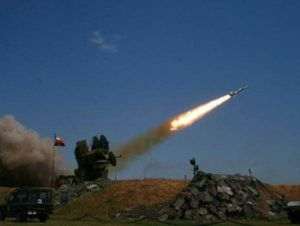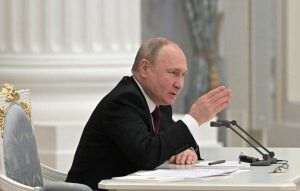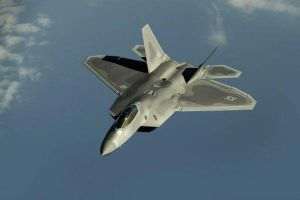The United States and Great Britain were ready last night to intervene against the regime of Bashar al-Assad, as a reaction to the alleged chemical attack against the Syrian civilians. The military analysts are saying that the United States will enter Syria even without an explicit mandate from the UN Security Council. Secretary of State John Kerry has already blamed the attacks with chemical weapons on the Assad regime, without waiting for a conclusion of the UN experts on site, as the Syrian authority deny the chemical weapons and are demanding that the western powers provide proof in that regard. Stratfor says that Kerry's statements actually represent the beginning of preparing the US public opinion for a military intervention in Syria.
Russia, China and Iran are the main major countries that oppose this military intervention. Analysts claim that there are negotiations between the Western powers and Vladimir Putin to convince him to accept an attack on Syria. Russia, however, maintains its current stance, and Kremlin officials say that any intervention will have "catastrophic consequences" for the countries in the Middle East and North Africa.
The Ministry of Foreign Affairs in Moscow called to the international community and the US to show caution. "The attempts to once again create artificial and unfounded excuses for a military intervention in the region will lead to further suffering in Syria", the Russian foreign minister said.
Determined to attack Syria, the United States have decided yesterday to postpone a bilateral reunion on the Syrian issue. The Russian deputy minister of foreign affairs said: "It is regrettable that our partners have decided to postpone the bilateral meeting between Russia and the US to discuss the matters concerning the summoning of an international conference concerning Syria. The drafting of the political regulation mechanisms in Syria would have been extremely useful even now when the threat of an armed intervention hangs above this country".
On every occasion, Russia has blocked any attempt of the international community to attack Syria, as it is the only state that gets crude oil from Syria.
Also, from Syria, Russia controls its last military facility in the Mediterranean, namely the military base in Tartus. The map projection of the area in question foreshadows a possible Russian corridor through the Mediterranean to the West on one hand, and a way of communicating with Turkey, on the other.
Moreover, an intervention of NATO in Syria would lead to the loss of the Russian influence in the Middle East, as a few years ago, Russia also lost Iraq, to the Americans.
• Oil and weapons, freely available
What is currently happening in Syria follows an already known pattern, which requires imposing and defending the interests of some megapowers, not just in the Syrian state, but in the entire area of the Middle East, some analysts consider.
"First of all, we need to associate, to an overwhelming degree, the idea of armed conflict with that of progress. Nobody denies the important role that war plays in stimulating research. For example, some of humanity's most notable inventions have appeared as a result of military research during some military conflicts, and the internet and the cellphone are just two of these inventions", sources from the military sector told us.
Only 10% of the discoveries that have influenced humanity can be attributed to the civilian sector, while the rest come from military research.
Also according to the statements of specialists in the field, the conflict in Syria should not be separated from the already far too familiar struggle of some of the Western countries to control the oil resources in the area.
When looking more closely at the situation in the area, all of Syria's neighbors have been "silenced", through a more or less convention method.
The Iraqi state, is still torn apart by the devastating effects of the 2003 intervention of NATO in 2003, attempting to restore its disaffected infrastructure.
Algeria and Morocco, have been silenced, through he French "soft-power", as they are nothing more than suppliers of cheap good quality oil.
Syria also has a border with Turkey, which has already taken a favorable position when it comes to the military intervention in Syria, as well as with Jordan, which is known as an outpost of the interests of the United States of America, if the situation were to require it.
Moreover, it shouldn't be overlooked that Syria is "a stone throw away" from Iran, an aspect which has an extremely important relevance for the manner in which a possible intervention on Syrian soil could happen.
The military experts are also saying: "In the end we need to think: who wins from a divided territory? Could it be those buying up very good quality oil at 10 dollars per barrel? Essentially, what is happening now in Syria has already happened in the past, in other parts of the world, so this shouldn't come as a surprise anymore".
Military analysts also claim that, given the effects of the Arab spring, an intervention in Syria could spark a pan-Arabic anti-American movement, and of all of the frustration of the citizens in the area, (which is fundamentally against their own governments) could become a perverted one and be moved against Israel and the US.
• Iran - the final stake for the West
Syria can be viewed as a bridge head for Iran, as, in Southern Syria and in Lebanon there is a Shiite population, many of them being members of Hezbollah.
Most of the Hezbollah cells are financed and armed in Iran and represent the main threat for Israel, the faction's sworn enemy.
Most likely, a strike on Syria would mean a double gain for the Americans: they open up the corridor for free oil in the area and they are getting closer to blockading Iran, the only enemy that would be capable of using the nuclear weapon in a conflict with the US.
If the US were ever forced to fight Iran, Israel, the Americans' main ally in the region, would be neutralized by Hezbollah, and the US, without Israel and Turkey, could face lots of difficulties in handling such a conflict.
Thus, "neutralizing" Syria also involves "neutralizing" Hezbollah (ardent supporters of the Basshar-al-Assad regime), which has recently been included by the EU on the list of terrorist factions.
On the other hand, Israel could, under the pretense of the escalation of the conflict in the region, find a valid reason to attack Lebanon, with which it has been in conflict with ever since 2006, when the "Lebanese war" between the two states occurred.
In that manner, Israel would triple the surface of its "security areas" and would have increased control over the resources in the Leviathan pool, in the Mediterranean Sea.
It bears reminding that the finding of some rich reserves of natural deposits in the Mediterranean Sea, on the East Coast, on the Border with Cyprus, Israel, Lebanon and Syria has sparked off a true race to exploit the resources in the area.
• Walid Mouallem: "Syria has means of defense that will surprise the world"
Syrian Foreign Affairs Minister Walid Mouallem a said on Tuesday that his country would defend itself in the event of Western Military attacks and said that the country has means of defense that would surprise the world, AFP says. "We have two options: either we surrender, or we defend ourselves with the means that we have available. The second option is the best: we will defend ourselves", he said in a press conference in Damascus. "Picking on Syria isn't something to be trifled with. We have means of defense that will surprise you".
Appearing before the press just as the West is preparing a strike against the regime, in reaction to the alleged chemical attacks, the head of the Syrian diplomacy has criticized the Western powers that don't present, in his opinion, the slightest evidence against the use of chemical weapons. "We keep hearing the drums of war around us. If they want to conduct an attack on Syria, I think that using the alibi of chemical weapons is not appropriate at all. I dare them to present the evidence they have", the head of the Syrian diplomacy said.
The minister warned that such an attack would not affect the military campaign that Damascus has been waging against the rebels for the last two years, especially on the outskirts of the Capital. "If they think they can prevent the victory of our armed forces like this, they are wrong", said Walid Mouallem.
In the opinion of the head of the Syrian diplomacy, a military intervention would only serve the interests of Israel and Al-Qaida. "The war effort of the United States and of their allies would only serve the interests of Israel and secondly, of the al-Nosra front", an armed faction that fights together with the Syrian rebels and which has sworn faith to Al-Qaida, he said.
• The persecution of Christians in Syria
The Christian community in Syria, one of the oldest in the world, was heavily shaken when the conflict began, as they were considered supporters of Assad's regime.
In spring , the Patriarchy of Antiochia reported that hundreds of Orthodox Christians had been killed in Syria, over 150,000 have been driven from their homes, and the churches have suffered incalculable losses. Also, several Christians, including two hierarchs, have been kidnapped.
Syrian Jacobite archbishop Yohanna Ibrahim and Greek Aleppo orthodox archbishop, Paul-Boulos Yazigi, the brother of patriarch John of Antiochia, have been kidnapped on April 22nd, and in spite of all the efforts, their fate is not yet known, more than 100 days after their disappearance.
The president of the International Union of Christians, Joseph Hakim, was announcing in the end of April that the rebels are using this conflict for an "ethnic cleanup", and were even speaking of a genocide against Christians.
Joseph Hakim was also warning against the passivity of the international community when it comes to "the killing of Christians, the decapitation of priests, the destruction of churches, the kidnapping of bishops", and went on to say: "We are dealing with coordinated actions for the liquidation of the Christian population in Syria, Egypt, Lebanon".
• Syria - the seed for a domestic political scandal
Starting the war in Syria could further encourage the endless domestic political conflict. President Traian Băsescu and the armed forces will want to continue honoring their commitments to NATO and will join forces with the Western powers, Crin Antonescu will probably not agree to that, and prime minister Victor Ponta will be placed in the middle, shifting the balance according to the interests of the power.
Traian Băsescu yesterday said that Romania must show consistency and prudence when it comes to the situation in Syria.
"I think that in such a situation, Romania should remain consistent. Sure, we see statements concerning one state or another, we see approaches that are more or less focused on military solutions. In my opinion, for Romania the solution is consistency and prudence", president Traian Băsescu said yesterday.
"In Syria we have over 10,000 Romanians - that is our estimate on how many are left out of 14,000. We have half a million Romanian speakers in Israel, we have long-standing economic relations with Egypt, Libya, Syria, Yemen. Political instability is causing us problems in terms of our economic relations and the tapping of our export potential", the president also said.
Traian Băsescu said: "Our cautiousness has a limit - which would be reached if we were asked to show solidarity with our allies. We will do it without any reticence. But until that happens, my option is cautiousness and maintaining the same lines of foreign policy that we currently have, whether we are talking about the Arab Spring, which has kind of failed, as long as the major democracies were not capable to support a democratic regime. But cautiousness can't go as far as not standing side by side with our allies, if the Security Council or NATO make one decision or another".
• Kissinger: Syria's "Balkanization"
In a recent interview, former US Secretary of State Henry Kissinger commented on the situation in Syria, expressing his preference for a dismantled and "Balkanized" Syria that would replace the Assad regime.
•
• The attack could come from the American cruisers in the Mediterranean Sea
The military specialists are also saying that the intervention will use long range Tomahawk missiles, launched off the American cruisers in the Mediterranean Sea. At the same time, there will be moves of the ground forces of the allies stationed in Jordan.
The air corridors will be secured using transit through Turkey, Jordan and Cyprus, as Israel will temporarily stay out of any involvement to avoid giving Iran any reasons to intervene in Syria's defense.
War planes and military carries have already begun arriving since last night, at Akrotiri, the British airbase in Cyprus, which is less than 100 miles (about 161 km) from the Syrian coast, which shows an intensification of the preparations for a military attack on the Assad regime in Syria, according to sources from the international press.
The American press yesterday wrote that the alternative that the Obama administration is considering is that of a short intervention, of about two days, which would have a limited impact - the targets would be military objectives, with no desire to remove Assad from power. Also, the prime minister has summoned a meeting of the Parliament, which is on leave, for Thursday, to discuss the issue of a reaction against Syria. According to some sources, the Syrian opposition was informed that it should get ready for an attack in the coming few days.
•
• Rome has rejected the notion of a military action in Syria without a UN warrant
Italy yesterday rejected the idea of a military intervention in Syria without the approval of the UN Security Council, saying that the only option is "a negotiated political solution", AFP reports.
"Italy will not participate in any military solution without the warrant of the UN Security Council", Italian foreign affairs minister Emma Bonino said before the Parliament. The minister announced that a reunion of the Security Council has been proposed for today, whereas NATO will discuss the Syrian issue on Thursday in Brussels. She has also announced that countries from the Friends of Syria group and the Syrian opposition will meet on September 4th, as part of a meeting of ministers, but she did not specify the place of the meeting. "The option of a limited military intervention threatens to become unlimited", said Bonino, who added that Italy is "already committed" from a military point of view in other regions in the world, especially in Afghanistan.
"There is no military solution to the Syrian conflict. The only solution is for a negotiated political solution", she reiterated, urging for more "determination" in continuing the negotiations between the parties which are in conflict. In spite of all this, a spokesperson of the Ministry of Defense said that the Italian aircraft and naval bases may be used by other countries for a potential attack, subject to Parliament approval. On the other hand, this approval would not be necessary for the military base of Sigonella, in Sicily, which is the object of a bilateral Italo-American agreement. The Italian military bases were widely used during the Western intervention in Libya, in 2011.
•
• The situation in Syria causes steep drops on the stock markets in the Persian Gulf
The stock markets of the oil monarchies in the Persian Gulf saw steep drops yesterday amid the concerns concerning a possible military intervention in Syria.
"This tumble on the main markets in the Gulf can be explained by the commotion caused by the Syrian issue", said Saudi financial analyst Bishr Bakhit, quoted by Agerpres.
The stock exchange in Dubai opened the session with a record drop of 7.01% down to 2,549.61 points, the largest 1-day drop after the global financial crisis of 2009. Shares of real estate group Emaar, one of the star companies of the Dubai stock market, saw a drop of 8.36%.
The stock market in Saudi Arabia, the biggest stock market in the Arab world, saw itself a drop of 4.12%, as the Tadawul All-Shares Index (TASI) closed at 7,722.7 points.
The second largest stock market in the United Arab Emirates, the one of Abu Dhabi, also saw a drop of 2.83% to 3,822.04 points, with most stocks, particularly those of real estate companies, closing in the red.
In Kuwait, the stock market saw a drop of 6.05%, due to the heavy losses of the main stocks in the real estate, industrial, energy and financial services sectors.
The Qatar stock exchange fell 1.28%, with other markets in the Gulf following a similar trend. The Muscat Securities Market fell 1.05% and that of the Bahrain Stock Exchange dropped 1.23%.
•
• Turkish lira reaches a new historic low, amid tensions in Syria
The Turkish lira yesterday fell against the US dollar, as the exchange rate rose above the psychological threshold of 2 liras/dollar, whereas the yield of 10-year bonds rose to 10.83%, on fears of a US strike on Syria. The markets were waiting yesterday for the Turkish Central Bank to stop the collapse of the currency, but governor Erdem Basci yesterday said that he does not intend to raise the policy rate to stop the depreciation of the lira.
He said: "We will not use the weapon of the interest rate as a tool against the exchange rate, we have no concerns from that point of view". Basci predicted that the lira would return to the level of 1.92 liras for a dollar at the end of the year, whereas the yields for the long term bonds could return below 10%. "Do not expect interest rate shocks from us, but instead expect interesting maneuvers on the forex market that will lead to a strengthening of the lira", Erdem Basci added.
The Turkish Central Bank has tightened the monetary conditions to support the lira, through a series of instruments, leaving the policy rate at 4.5%.
"The recent evolutions in Syria indicate the possibility of a military intervention in this country, which the markets perceive as being negative for markets such as Turkey", said Fatih Keresteci, a strategist at HSBC Bank in Turkey, quoted by the international press. He also said: "The hyperactive monetary policy of the Turkish central bank, which is intended to reduce the selling pressure, is creating a second wave of selling, because it generates uncertainty. The lira will remain under pressure until the central bank will opt for an orthodox policy and make the lira attractive again".
Over the last few days, the Turkish Central Bank intervened in the market, with 700 million dollars, buying liras, and has declined over the last few trading sessions to grant financing to the commercial banks at the lowest interest rate of the band.
Thus, the Turkish lira had, over the last five days, the weakest evolution among the emerging currencies in Europe, the Middle East and Africa.
"Syria, geopolitical risks and the drop of the investors' risk appetite are factors that currently affect the currencies of the emerging markets. The central bank's policy to restrict liquidity daily is proving completely ineffective and has the reverse effect on the market, because it erodes the reserves", said an analyst of Swissquote Bank, Geneva, quoted by Bloomberg.
The expectations that the US Federal Reserve (Fed) could soon begin cutting the stimulus program dealt a blow to the appetite for emerging markets, which makes Turkey's current account deficit extremely vulnerable, according to Reuters.
Turkey is dependent on the foreign flows to finance its deficit, which amounts to approximately 7.1% of the country's economic output.
Raising interest rates makes the lira more attractive to foreign investors, but it could harm economic growth, which is something that the government of Tayyip Erdogan wants to avoid, before the general elections of 2015.
The record reached yesterday by the Turkish lira was 2.0368 liras/dollar, an all time low according to Bloomberg data.
The 10-year borrowing cost of the government in Ankara rose 0.32%, from 10.5%, to a 3-year high.
Turkey will join a coalition against Syria if the UN doesn't intervene, amid accusations that forces loyal to the Bashar al-Assad regime used chemical weapons, according to the Turkish foreign affairs minister, Ahmet Davutoglu.
Prior to the escalation of the tensions in Syria, the Turkish lira was already seeing steep drops, together with the Indian rupee, the Brazilian real, and other emerging currencies, following the capital withdrawals started off by the hints of the US Federal Reserve concerning the restriction of the quantitative easing program which has significantly increased the dollar's liquidity over the last two years.
According to the latest data, on August 16th, Turkey's Central Bank had reserves of 109 billion dollars, according to the latest data. (VERONICA PLĂCINTESCU)


















































